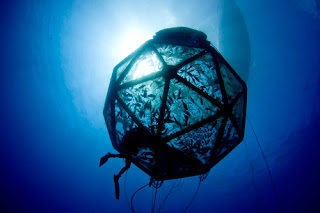Below are excerpts from a Joint Comment issued by a coalition of environmental organizations to the EPA, expressing manifold concerns about the agency's assessment of a commercial fish farm seeking to operate off the coast of Sarasota County.
================
The permit would allow Kampachi Farms, LLC to operate the only industrial ocean fish farm in U.S. federal waters – in the Gulf of Mexico approximately 40 miles from the coast of Sarasota, FL – and discharge untreated, industrial wastewater from the facility directly into the surrounding ocean.
Industrial ocean fish farming – also known as offshore or marine finfish aquaculture – is the mass cultivation of finned fish in the ocean, in net pens, pods, and cages.
These are essentially floating feedlots in open water, which can have devastating environmental and socio-economic impacts.
 |
| Kampachi Fish Pod |
- . . . escaped farmed fish will likely spread a multitude of parasites and diseases to wild stocks, which could prove fatal when transmitted.
- It is no secret that confining large populations of animals will breed pests and disease. In response, the agriculture and aquaculture sectors administer a pharmacopeia of chemicals – and in the open ocean, residues of these drugs are discharged and absorbed into the marine ecosystem.
- the use of antibiotics in marine finfish aquaculture facilities is contributing to the public health crisis of antibiotic resistance. For farmed fish, antibiotics not only leave residues in your seafood, but they also leach into the ocean, contaminating nearby water and marine life.
- Another vital concern is the direct discharge of untreated toxins, including excess food, feces, antibiotics, and antifoulants associated with industrial ocean fish farms.
- These underwater factory farms can also physically impact the seafloor by creating dead zones
- EPA . . . must assess the myriad environmental, socioeconomic, and human health impacts from the full scope of the intended operations
- We also urge EPA to fully consider the range of available alternatives that can increase domestic seafood production while avoiding and/or reducing environmental, public health, and socio- economic impacts.
- In this instance, EPA has unlawfully failed to meet its ESA [Endangered Species Act] mandate.. . . EPA has not provided sufficient data to support its conclusions, and made no attempt to quantify or analyze the potential harm from several significant impacts to the Listed Species.
- In conclusion, EPA must remedy the above violations of law prior to reaching a decision on the permit. We strongly oppose issuance of the permit for industrial wastewater discharge from a marine finfish aquaculture facility in the Gulf of Mexico, and we request that EPA hold a public hearing, with the opportunity for live public testimony, prior to reaching a decision on the permit.
For the foregoing reasons, the undersigned organizations strongly oppose EPA’s issuance of the permit.
Friends of the Earth,
Center for Food Safety,
Center for Biological Diversity,
Food & Water Watch,
Healthy Gulf,
Institute for Fisheries Resources,
National Family Farm Coalition,
Northwest Atlantic Marine Alliance,
NY4WHALES,
Ocean Conservation Research,
Pacific Coast Federation of Fishermen’s Associations,
Sanctuary Education Advisory Specialists LLC,
EPA public hearing details:
- Date: January 28, 2020
- Time: 5:30 PM - 9:30 PM
- Location: Wave Center
- Mote Marine Laboratory
- 1600 Ken Thompson Pkwy, Sarasota, FL 34236
Also:
Justin Bloom from Suncoast Waterkeeper will offer an update on this issue at CONA Sarasota Jan. 10. Details here.
No comments:
Post a Comment